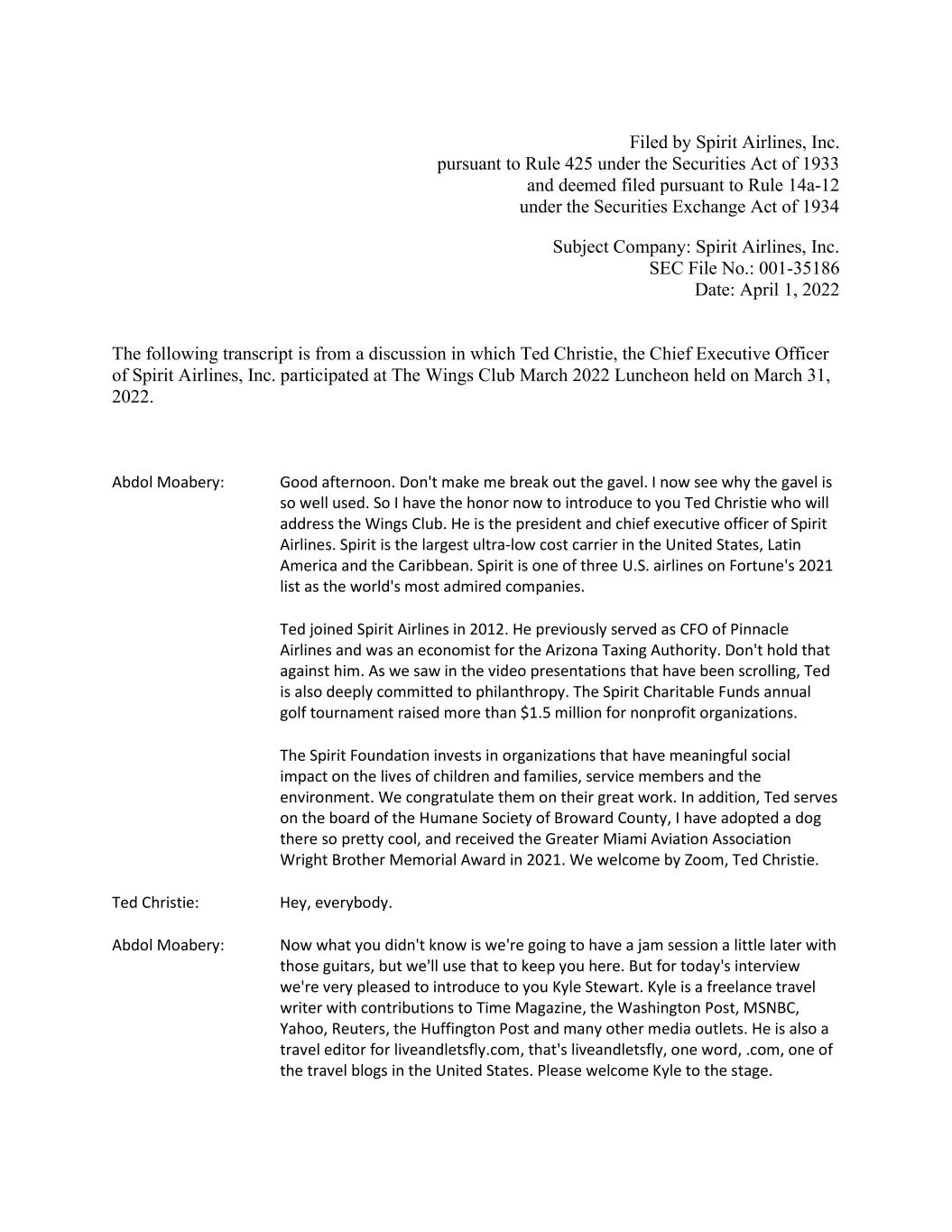
Filed by Spirit Airlines, Inc. pursuant to Rule 425 under the Securities Act of 1933 and deemed filed pursuant to Rule 14a-12 under the Securities Exchange Act of 1934 Subject Company: Spirit Airlines, Inc. SEC File No.: 001-35186 Date: April 1, 2022 The following transcript is from a discussion in which Ted Christie, the Chief Executive Officer of Spirit Airlines, Inc. participated at The Wings Club March 2022 Luncheon held on March 31, 2022. Abdol Moabery: Good afternoon. Don't make me break out the gavel. I now see why the gavel is so well used. So I have the honor now to introduce to you Ted Christie who will address the Wings Club. He is the president and chief executive officer of Spirit Airlines. Spirit is the largest ultra-low cost carrier in the United States, Latin America and the Caribbean. Spirit is one of three U.S. airlines on Fortune's 2021 list as the world's most admired companies. Ted joined Spirit Airlines in 2012. He previously served as CFO of Pinnacle Airlines and was an economist for the Arizona Taxing Authority. Don't hold that against him. As we saw in the video presentations that have been scrolling, Ted is also deeply committed to philanthropy. The Spirit Charitable Funds annual golf tournament raised more than $1.5 million for nonprofit organizations. The Spirit Foundation invests in organizations that have meaningful social impact on the lives of children and families, service members and the environment. We congratulate them on their great work. In addition, Ted serves on the board of the Humane Society of Broward County, I have adopted a dog there so pretty cool, and received the Greater Miami Aviation Association Wright Brother Memorial Award in 2021. We welcome by Zoom, Ted Christie. Ted Christie: Hey, everybody. Abdol Moabery: Now what you didn't know is we're going to have a jam session a little later with those guitars, but we'll use that to keep you here. But for today's interview we're very pleased to introduce to you Kyle Stewart. Kyle is a freelance travel writer with contributions to Time Magazine, the Washington Post, MSNBC, Yahoo, Reuters, the Huffington Post and many other media outlets. He is also a travel editor for liveandletsfly.com, that's liveandletsfly, one word, .com, one of the travel blogs in the United States. Please welcome Kyle to the stage.
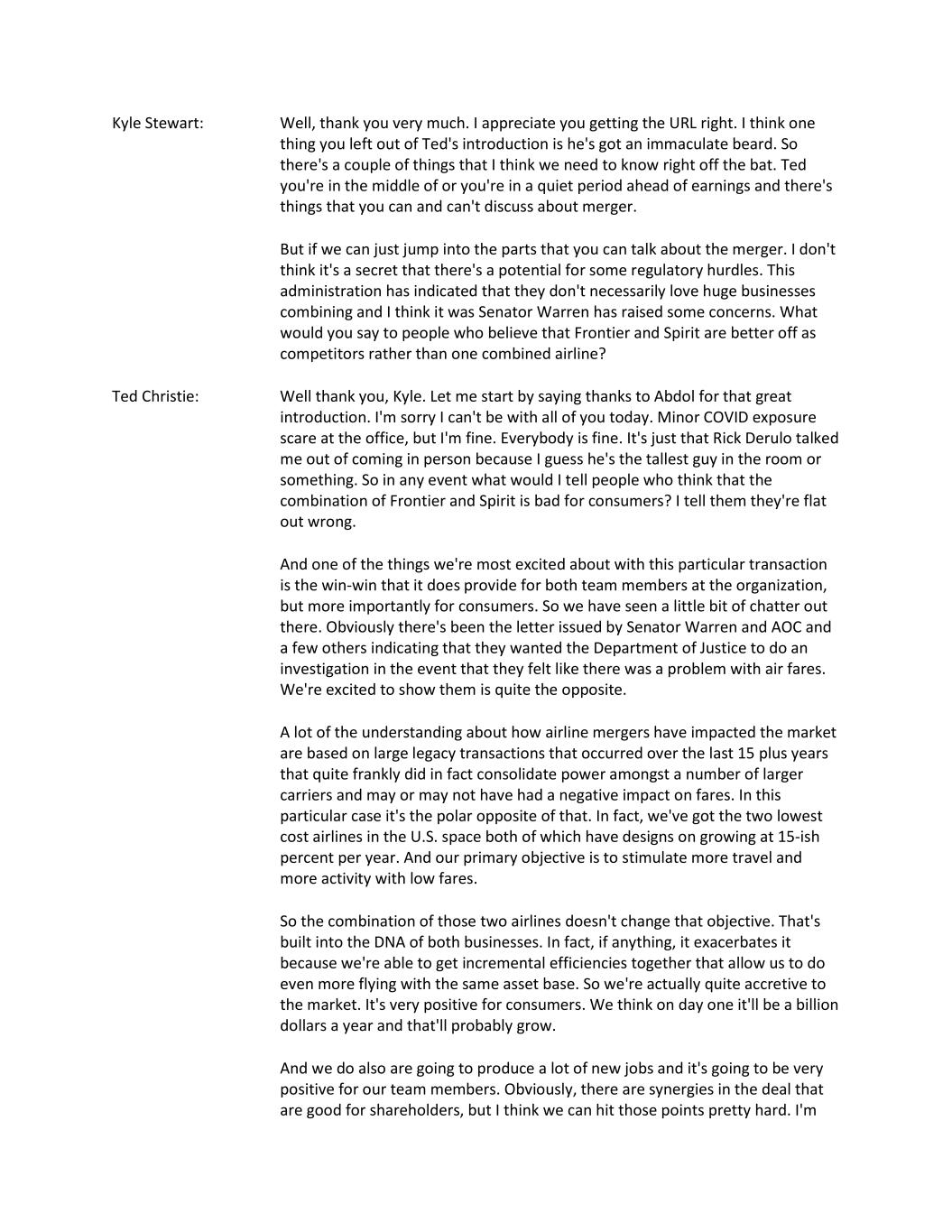
Kyle Stewart: Well, thank you very much. I appreciate you getting the URL right. I think one thing you left out of Ted's introduction is he's got an immaculate beard. So there's a couple of things that I think we need to know right off the bat. Ted you're in the middle of or you're in a quiet period ahead of earnings and there's things that you can and can't discuss about merger. But if we can just jump into the parts that you can talk about the merger. I don't think it's a secret that there's a potential for some regulatory hurdles. This administration has indicated that they don't necessarily love huge businesses combining and I think it was Senator Warren has raised some concerns. What would you say to people who believe that Frontier and Spirit are better off as competitors rather than one combined airline? Ted Christie: Well thank you, Kyle. Let me start by saying thanks to Abdol for that great introduction. I'm sorry I can't be with all of you today. Minor COVID exposure scare at the office, but I'm fine. Everybody is fine. It's just that Rick Derulo talked me out of coming in person because I guess he's the tallest guy in the room or something. So in any event what would I tell people who think that the combination of Frontier and Spirit is bad for consumers? I tell them they're flat out wrong. And one of the things we're most excited about with this particular transaction is the win-win that it does provide for both team members at the organization, but more importantly for consumers. So we have seen a little bit of chatter out there. Obviously there's been the letter issued by Senator Warren and AOC and a few others indicating that they wanted the Department of Justice to do an investigation in the event that they felt like there was a problem with air fares. We're excited to show them is quite the opposite. A lot of the understanding about how airline mergers have impacted the market are based on large legacy transactions that occurred over the last 15 plus years that quite frankly did in fact consolidate power amongst a number of larger carriers and may or may not have had a negative impact on fares. In this particular case it's the polar opposite of that. In fact, we've got the two lowest cost airlines in the U.S. space both of which have designs on growing at 15-ish percent per year. And our primary objective is to stimulate more travel and more activity with low fares. So the combination of those two airlines doesn't change that objective. That's built into the DNA of both businesses. In fact, if anything, it exacerbates it because we're able to get incremental efficiencies together that allow us to do even more flying with the same asset base. So we're actually quite accretive to the market. It's very positive for consumers. We think on day one it'll be a billion dollars a year and that'll probably grow. And we do also are going to produce a lot of new jobs and it's going to be very positive for our team members. Obviously, there are synergies in the deal that are good for shareholders, but I think we can hit those points pretty hard. I'm
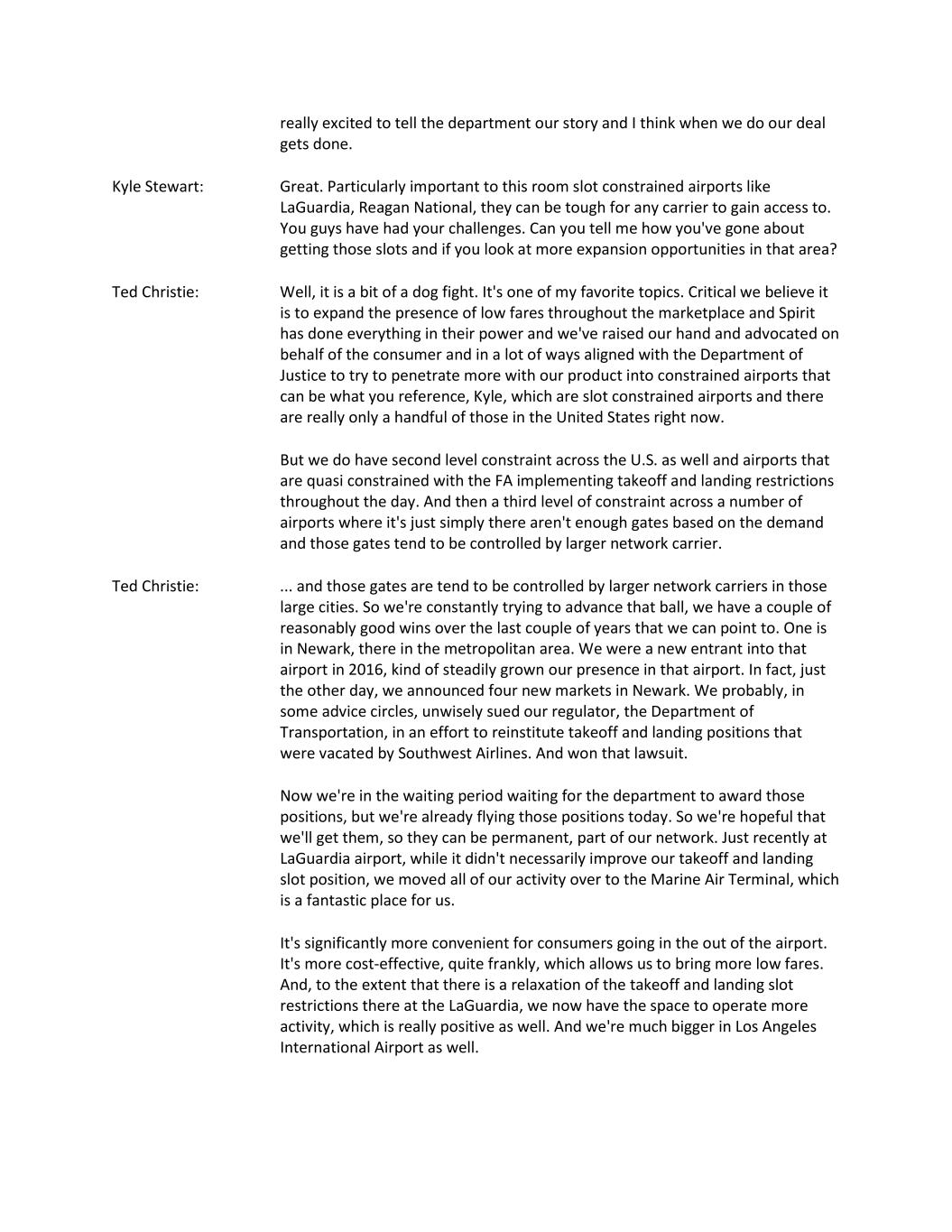
really excited to tell the department our story and I think when we do our deal gets done. Kyle Stewart: Great. Particularly important to this room slot constrained airports like LaGuardia, Reagan National, they can be tough for any carrier to gain access to. You guys have had your challenges. Can you tell me how you've gone about getting those slots and if you look at more expansion opportunities in that area? Ted Christie: Well, it is a bit of a dog fight. It's one of my favorite topics. Critical we believe it is to expand the presence of low fares throughout the marketplace and Spirit has done everything in their power and we've raised our hand and advocated on behalf of the consumer and in a lot of ways aligned with the Department of Justice to try to penetrate more with our product into constrained airports that can be what you reference, Kyle, which are slot constrained airports and there are really only a handful of those in the United States right now. But we do have second level constraint across the U.S. as well and airports that are quasi constrained with the FA implementing takeoff and landing restrictions throughout the day. And then a third level of constraint across a number of airports where it's just simply there aren't enough gates based on the demand and those gates tend to be controlled by larger network carrier. Ted Christie: ... and those gates are tend to be controlled by larger network carriers in those large cities. So we're constantly trying to advance that ball, we have a couple of reasonably good wins over the last couple of years that we can point to. One is in Newark, there in the metropolitan area. We were a new entrant into that airport in 2016, kind of steadily grown our presence in that airport. In fact, just the other day, we announced four new markets in Newark. We probably, in some advice circles, unwisely sued our regulator, the Department of Transportation, in an effort to reinstitute takeoff and landing positions that were vacated by Southwest Airlines. And won that lawsuit. Now we're in the waiting period waiting for the department to award those positions, but we're already flying those positions today. So we're hopeful that we'll get them, so they can be permanent, part of our network. Just recently at LaGuardia airport, while it didn't necessarily improve our takeoff and landing slot position, we moved all of our activity over to the Marine Air Terminal, which is a fantastic place for us. It's significantly more convenient for consumers going in the out of the airport. It's more cost-effective, quite frankly, which allows us to bring more low fares. And, to the extent that there is a relaxation of the takeoff and landing slot restrictions there at the LaGuardia, we now have the space to operate more activity, which is really positive as well. And we're much bigger in Los Angeles International Airport as well.
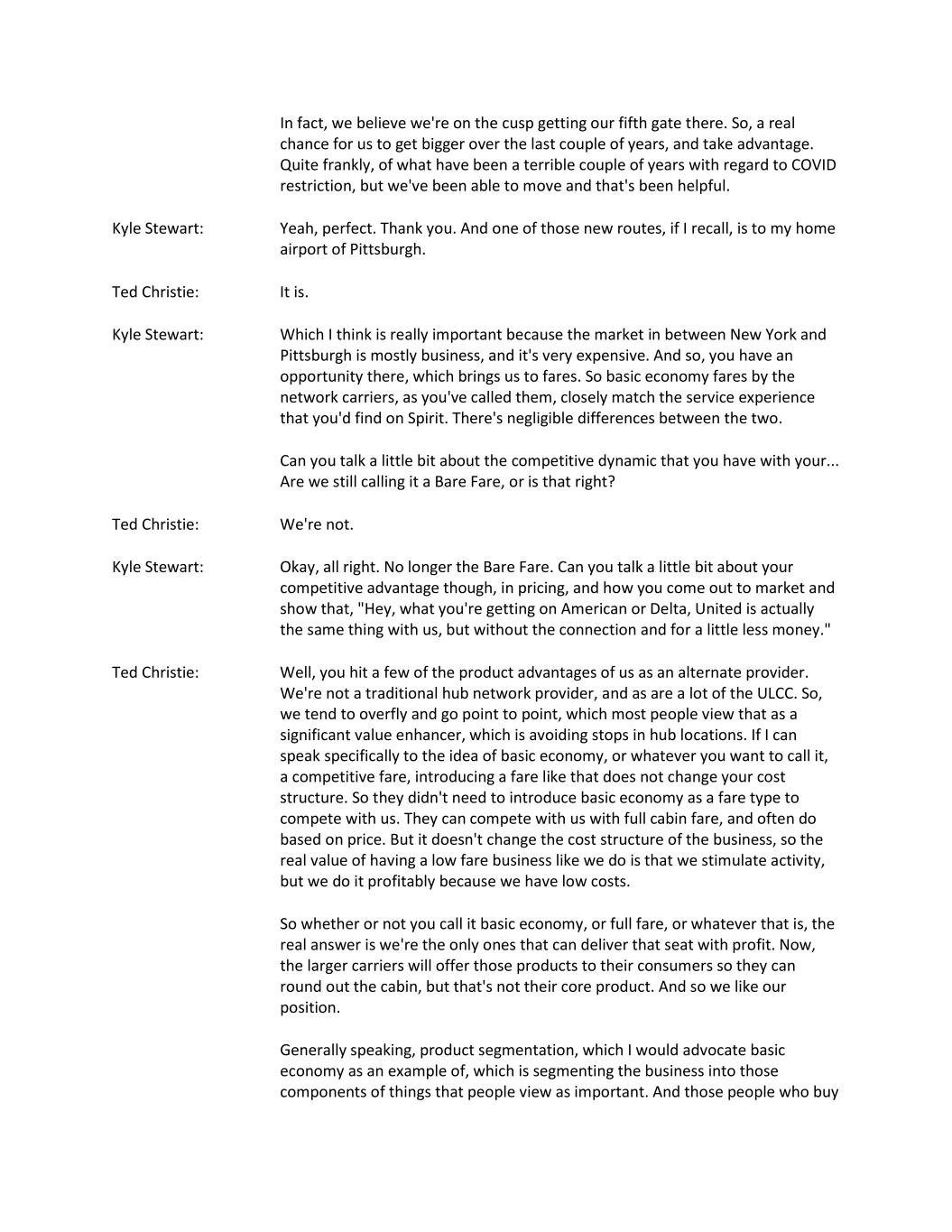
In fact, we believe we're on the cusp getting our fifth gate there. So, a real chance for us to get bigger over the last couple of years, and take advantage. Quite frankly, of what have been a terrible couple of years with regard to COVID restriction, but we've been able to move and that's been helpful. Kyle Stewart: Yeah, perfect. Thank you. And one of those new routes, if I recall, is to my home airport of Pittsburgh. Ted Christie: It is. Kyle Stewart: Which I think is really important because the market in between New York and Pittsburgh is mostly business, and it's very expensive. And so, you have an opportunity there, which brings us to fares. So basic economy fares by the network carriers, as you've called them, closely match the service experience that you'd find on Spirit. There's negligible differences between the two. Can you talk a little bit about the competitive dynamic that you have with your... Are we still calling it a Bare Fare, or is that right? Ted Christie: We're not. Kyle Stewart: Okay, all right. No longer the Bare Fare. Can you talk a little bit about your competitive advantage though, in pricing, and how you come out to market and show that, "Hey, what you're getting on American or Delta, United is actually the same thing with us, but without the connection and for a little less money." Ted Christie: Well, you hit a few of the product advantages of us as an alternate provider. We're not a traditional hub network provider, and as are a lot of the ULCC. So, we tend to overfly and go point to point, which most people view that as a significant value enhancer, which is avoiding stops in hub locations. If I can speak specifically to the idea of basic economy, or whatever you want to call it, a competitive fare, introducing a fare like that does not change your cost structure. So they didn't need to introduce basic economy as a fare type to compete with us. They can compete with us with full cabin fare, and often do based on price. But it doesn't change the cost structure of the business, so the real value of having a low fare business like we do is that we stimulate activity, but we do it profitably because we have low costs. So whether or not you call it basic economy, or full fare, or whatever that is, the real answer is we're the only ones that can deliver that seat with profit. Now, the larger carriers will offer those products to their consumers so they can round out the cabin, but that's not their core product. And so we like our position. Generally speaking, product segmentation, which I would advocate basic economy as an example of, which is segmenting the business into those components of things that people view as important. And those people who buy
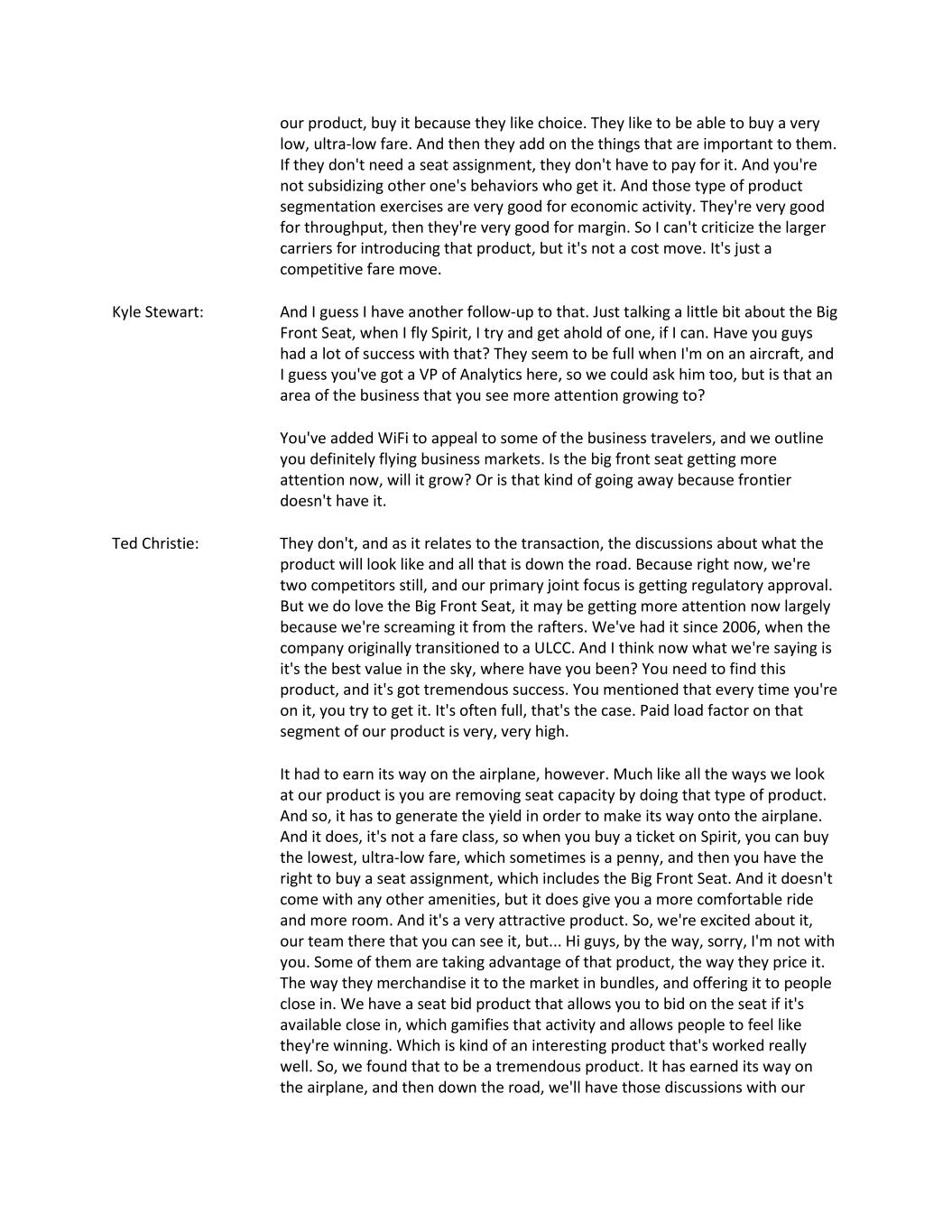
our product, buy it because they like choice. They like to be able to buy a very low, ultra-low fare. And then they add on the things that are important to them. If they don't need a seat assignment, they don't have to pay for it. And you're not subsidizing other one's behaviors who get it. And those type of product segmentation exercises are very good for economic activity. They're very good for throughput, then they're very good for margin. So I can't criticize the larger carriers for introducing that product, but it's not a cost move. It's just a competitive fare move. Kyle Stewart: And I guess I have another follow-up to that. Just talking a little bit about the Big Front Seat, when I fly Spirit, I try and get ahold of one, if I can. Have you guys had a lot of success with that? They seem to be full when I'm on an aircraft, and I guess you've got a VP of Analytics here, so we could ask him too, but is that an area of the business that you see more attention growing to? You've added WiFi to appeal to some of the business travelers, and we outline you definitely flying business markets. Is the big front seat getting more attention now, will it grow? Or is that kind of going away because frontier doesn't have it. Ted Christie: They don't, and as it relates to the transaction, the discussions about what the product will look like and all that is down the road. Because right now, we're two competitors still, and our primary joint focus is getting regulatory approval. But we do love the Big Front Seat, it may be getting more attention now largely because we're screaming it from the rafters. We've had it since 2006, when the company originally transitioned to a ULCC. And I think now what we're saying is it's the best value in the sky, where have you been? You need to find this product, and it's got tremendous success. You mentioned that every time you're on it, you try to get it. It's often full, that's the case. Paid load factor on that segment of our product is very, very high. It had to earn its way on the airplane, however. Much like all the ways we look at our product is you are removing seat capacity by doing that type of product. And so, it has to generate the yield in order to make its way onto the airplane. And it does, it's not a fare class, so when you buy a ticket on Spirit, you can buy the lowest, ultra-low fare, which sometimes is a penny, and then you have the right to buy a seat assignment, which includes the Big Front Seat. And it doesn't come with any other amenities, but it does give you a more comfortable ride and more room. And it's a very attractive product. So, we're excited about it, our team there that you can see it, but... Hi guys, by the way, sorry, I'm not with you. Some of them are taking advantage of that product, the way they price it. The way they merchandise it to the market in bundles, and offering it to people close in. We have a seat bid product that allows you to bid on the seat if it's available close in, which gamifies that activity and allows people to feel like they're winning. Which is kind of an interesting product that's worked really well. So, we found that to be a tremendous product. It has earned its way on the airplane, and then down the road, we'll have those discussions with our
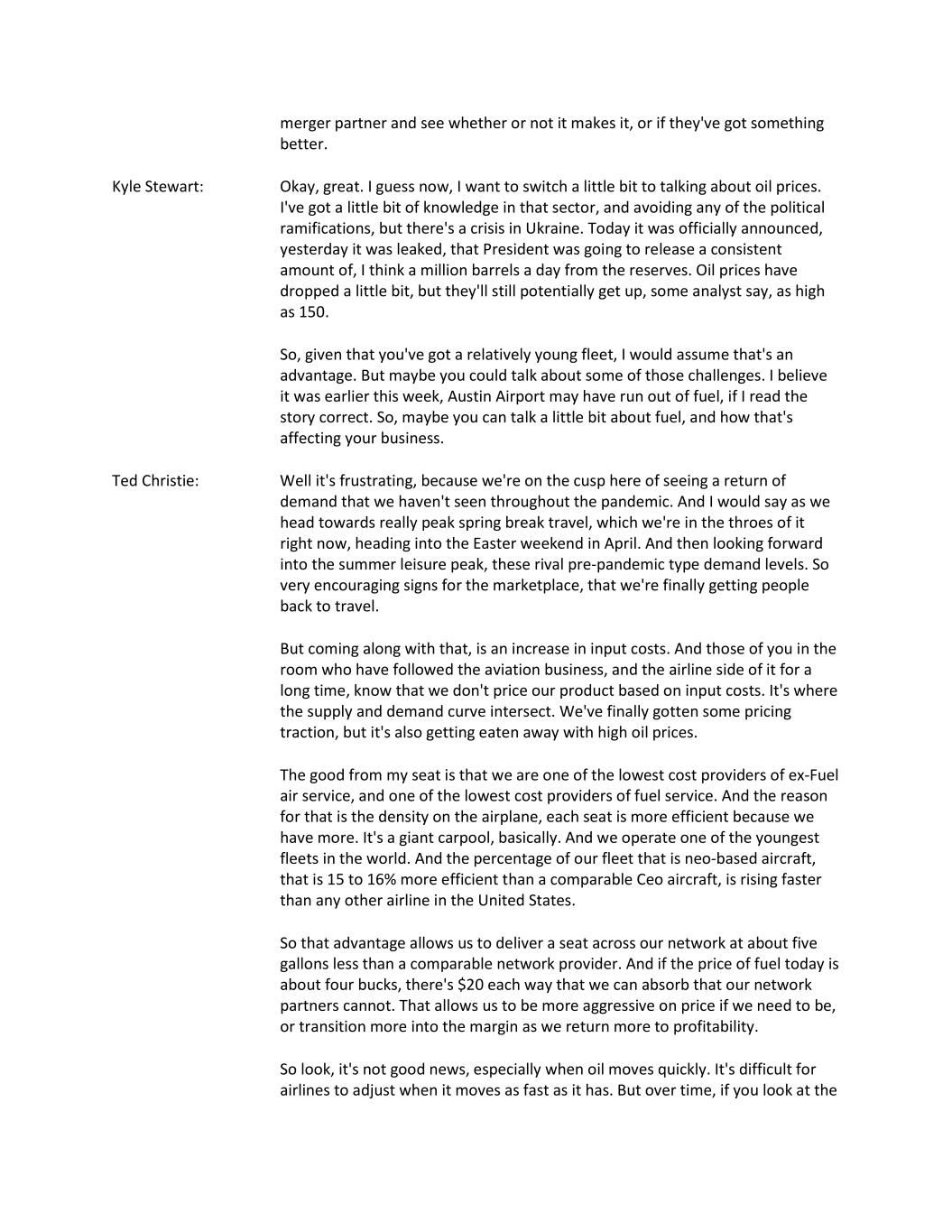
merger partner and see whether or not it makes it, or if they've got something better. Kyle Stewart: Okay, great. I guess now, I want to switch a little bit to talking about oil prices. I've got a little bit of knowledge in that sector, and avoiding any of the political ramifications, but there's a crisis in Ukraine. Today it was officially announced, yesterday it was leaked, that President was going to release a consistent amount of, I think a million barrels a day from the reserves. Oil prices have dropped a little bit, but they'll still potentially get up, some analyst say, as high as 150. So, given that you've got a relatively young fleet, I would assume that's an advantage. But maybe you could talk about some of those challenges. I believe it was earlier this week, Austin Airport may have run out of fuel, if I read the story correct. So, maybe you can talk a little bit about fuel, and how that's affecting your business. Ted Christie: Well it's frustrating, because we're on the cusp here of seeing a return of demand that we haven't seen throughout the pandemic. And I would say as we head towards really peak spring break travel, which we're in the throes of it right now, heading into the Easter weekend in April. And then looking forward into the summer leisure peak, these rival pre-pandemic type demand levels. So very encouraging signs for the marketplace, that we're finally getting people back to travel. But coming along with that, is an increase in input costs. And those of you in the room who have followed the aviation business, and the airline side of it for a long time, know that we don't price our product based on input costs. It's where the supply and demand curve intersect. We've finally gotten some pricing traction, but it's also getting eaten away with high oil prices. The good from my seat is that we are one of the lowest cost providers of ex-Fuel air service, and one of the lowest cost providers of fuel service. And the reason for that is the density on the airplane, each seat is more efficient because we have more. It's a giant carpool, basically. And we operate one of the youngest fleets in the world. And the percentage of our fleet that is neo-based aircraft, that is 15 to 16% more efficient than a comparable Ceo aircraft, is rising faster than any other airline in the United States. So that advantage allows us to deliver a seat across our network at about five gallons less than a comparable network provider. And if the price of fuel today is about four bucks, there's $20 each way that we can absorb that our network partners cannot. That allows us to be more aggressive on price if we need to be, or transition more into the margin as we return more to profitability. So look, it's not good news, especially when oil moves quickly. It's difficult for airlines to adjust when it moves as fast as it has. But over time, if you look at the
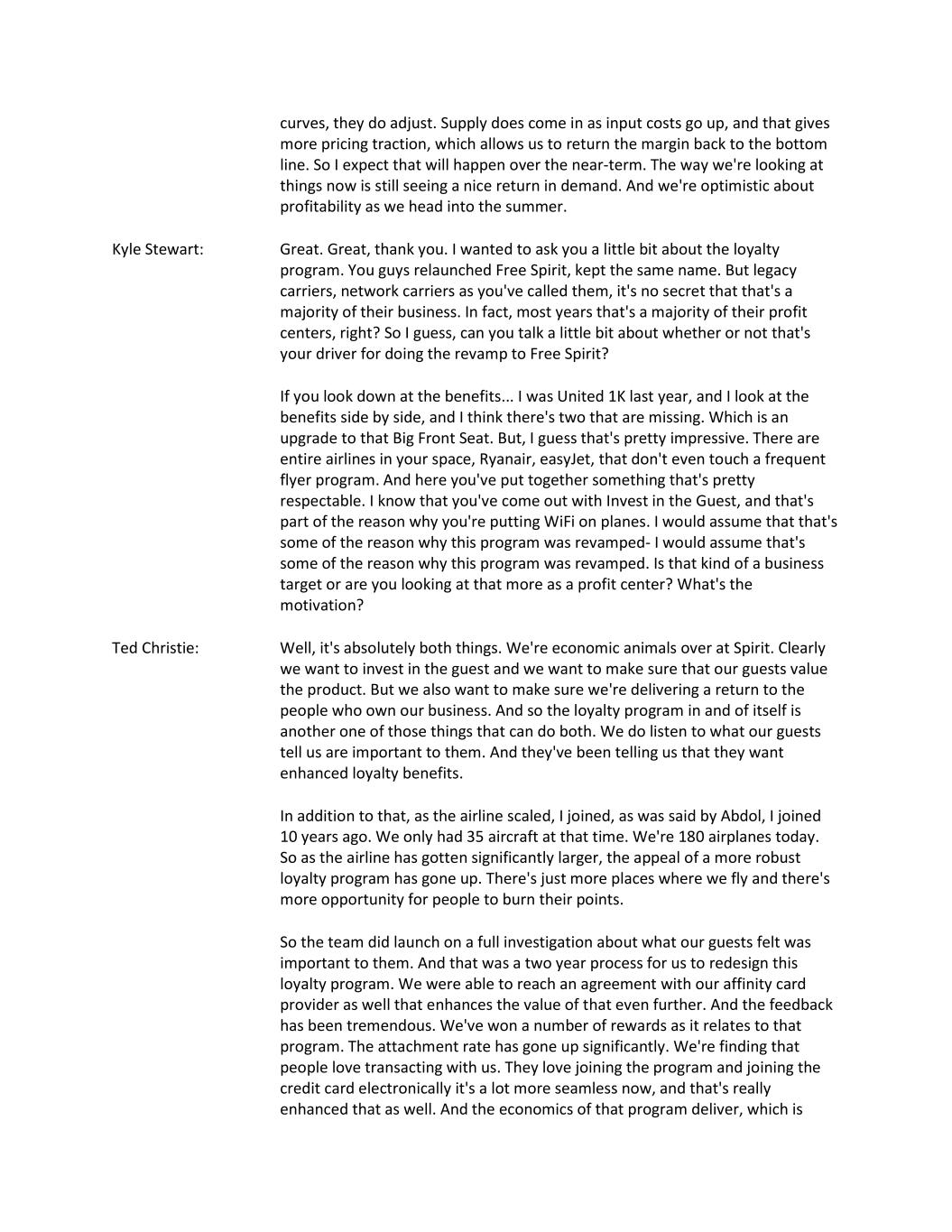
curves, they do adjust. Supply does come in as input costs go up, and that gives more pricing traction, which allows us to return the margin back to the bottom line. So I expect that will happen over the near-term. The way we're looking at things now is still seeing a nice return in demand. And we're optimistic about profitability as we head into the summer. Kyle Stewart: Great. Great, thank you. I wanted to ask you a little bit about the loyalty program. You guys relaunched Free Spirit, kept the same name. But legacy carriers, network carriers as you've called them, it's no secret that that's a majority of their business. In fact, most years that's a majority of their profit centers, right? So I guess, can you talk a little bit about whether or not that's your driver for doing the revamp to Free Spirit? If you look down at the benefits... I was United 1K last year, and I look at the benefits side by side, and I think there's two that are missing. Which is an upgrade to that Big Front Seat. But, I guess that's pretty impressive. There are entire airlines in your space, Ryanair, easyJet, that don't even touch a frequent flyer program. And here you've put together something that's pretty respectable. I know that you've come out with Invest in the Guest, and that's part of the reason why you're putting WiFi on planes. I would assume that that's some of the reason why this program was revamped- I would assume that's some of the reason why this program was revamped. Is that kind of a business target or are you looking at that more as a profit center? What's the motivation? Ted Christie: Well, it's absolutely both things. We're economic animals over at Spirit. Clearly we want to invest in the guest and we want to make sure that our guests value the product. But we also want to make sure we're delivering a return to the people who own our business. And so the loyalty program in and of itself is another one of those things that can do both. We do listen to what our guests tell us are important to them. And they've been telling us that they want enhanced loyalty benefits. In addition to that, as the airline scaled, I joined, as was said by Abdol, I joined 10 years ago. We only had 35 aircraft at that time. We're 180 airplanes today. So as the airline has gotten significantly larger, the appeal of a more robust loyalty program has gone up. There's just more places where we fly and there's more opportunity for people to burn their points. So the team did launch on a full investigation about what our guests felt was important to them. And that was a two year process for us to redesign this loyalty program. We were able to reach an agreement with our affinity card provider as well that enhances the value of that even further. And the feedback has been tremendous. We've won a number of rewards as it relates to that program. The attachment rate has gone up significantly. We're finding that people love transacting with us. They love joining the program and joining the credit card electronically it's a lot more seamless now, and that's really enhanced that as well. And the economics of that program deliver, which is
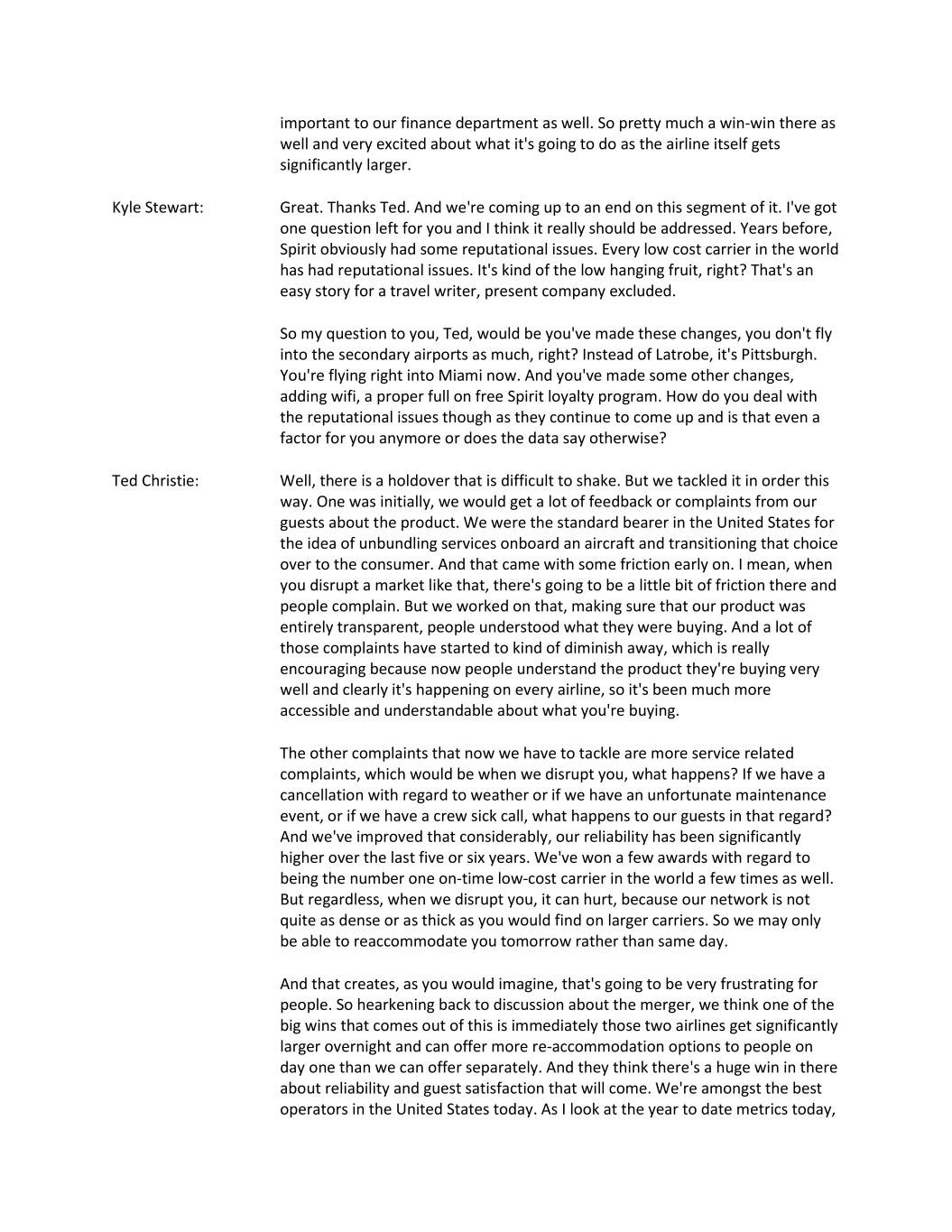
important to our finance department as well. So pretty much a win-win there as well and very excited about what it's going to do as the airline itself gets significantly larger. Kyle Stewart: Great. Thanks Ted. And we're coming up to an end on this segment of it. I've got one question left for you and I think it really should be addressed. Years before, Spirit obviously had some reputational issues. Every low cost carrier in the world has had reputational issues. It's kind of the low hanging fruit, right? That's an easy story for a travel writer, present company excluded. So my question to you, Ted, would be you've made these changes, you don't fly into the secondary airports as much, right? Instead of Latrobe, it's Pittsburgh. You're flying right into Miami now. And you've made some other changes, adding wifi, a proper full on free Spirit loyalty program. How do you deal with the reputational issues though as they continue to come up and is that even a factor for you anymore or does the data say otherwise? Ted Christie: Well, there is a holdover that is difficult to shake. But we tackled it in order this way. One was initially, we would get a lot of feedback or complaints from our guests about the product. We were the standard bearer in the United States for the idea of unbundling services onboard an aircraft and transitioning that choice over to the consumer. And that came with some friction early on. I mean, when you disrupt a market like that, there's going to be a little bit of friction there and people complain. But we worked on that, making sure that our product was entirely transparent, people understood what they were buying. And a lot of those complaints have started to kind of diminish away, which is really encouraging because now people understand the product they're buying very well and clearly it's happening on every airline, so it's been much more accessible and understandable about what you're buying. The other complaints that now we have to tackle are more service related complaints, which would be when we disrupt you, what happens? If we have a cancellation with regard to weather or if we have an unfortunate maintenance event, or if we have a crew sick call, what happens to our guests in that regard? And we've improved that considerably, our reliability has been significantly higher over the last five or six years. We've won a few awards with regard to being the number one on-time low-cost carrier in the world a few times as well. But regardless, when we disrupt you, it can hurt, because our network is not quite as dense or as thick as you would find on larger carriers. So we may only be able to reaccommodate you tomorrow rather than same day. And that creates, as you would imagine, that's going to be very frustrating for people. So hearkening back to discussion about the merger, we think one of the big wins that comes out of this is immediately those two airlines get significantly larger overnight and can offer more re-accommodation options to people on day one than we can offer separately. And they think there's a huge win in there about reliability and guest satisfaction that will come. We're amongst the best operators in the United States today. As I look at the year to date metrics today,
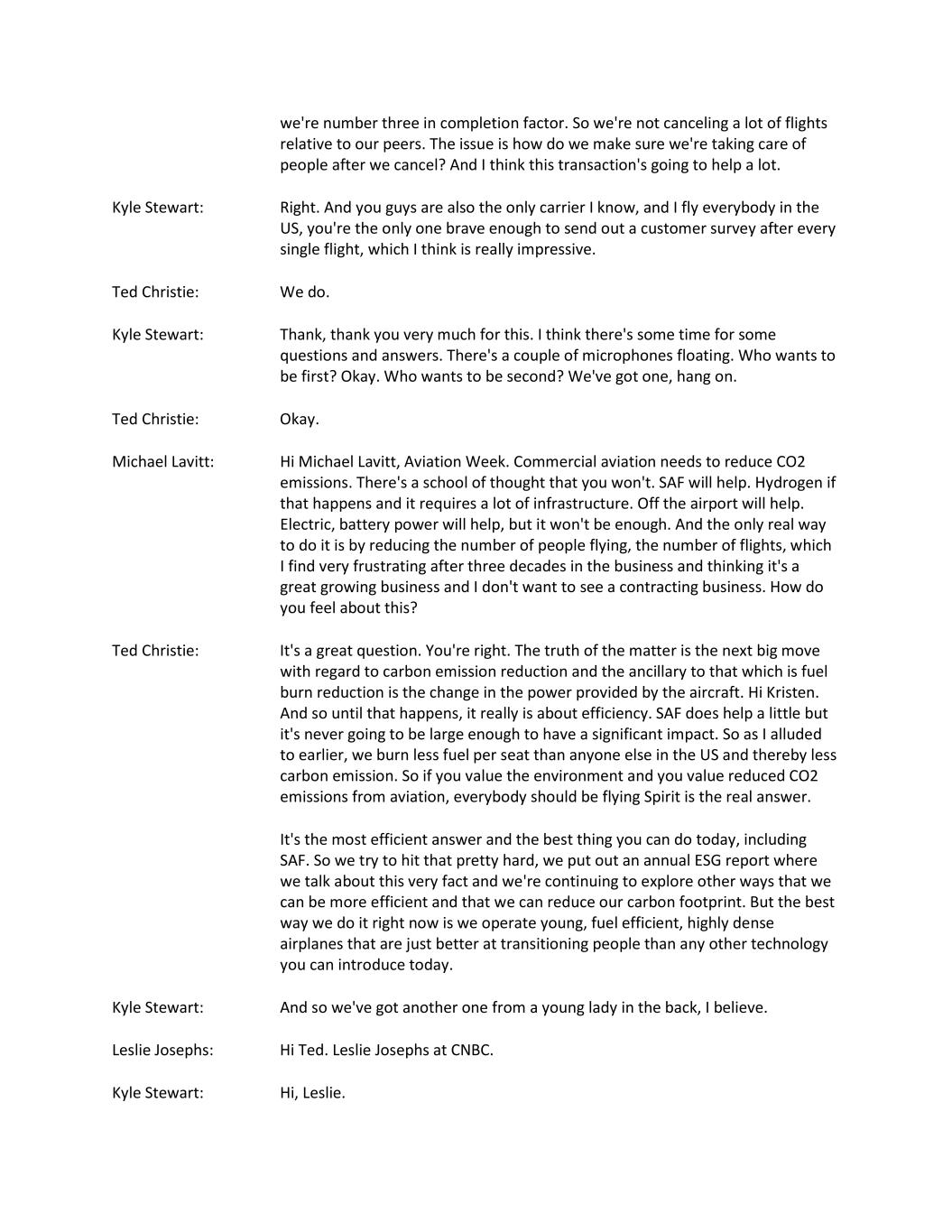
we're number three in completion factor. So we're not canceling a lot of flights relative to our peers. The issue is how do we make sure we're taking care of people after we cancel? And I think this transaction's going to help a lot. Kyle Stewart: Right. And you guys are also the only carrier I know, and I fly everybody in the US, you're the only one brave enough to send out a customer survey after every single flight, which I think is really impressive. Ted Christie: We do. Kyle Stewart: Thank, thank you very much for this. I think there's some time for some questions and answers. There's a couple of microphones floating. Who wants to be first? Okay. Who wants to be second? We've got one, hang on. Ted Christie: Okay. Michael Lavitt: Hi Michael Lavitt, Aviation Week. Commercial aviation needs to reduce CO2 emissions. There's a school of thought that you won't. SAF will help. Hydrogen if that happens and it requires a lot of infrastructure. Off the airport will help. Electric, battery power will help, but it won't be enough. And the only real way to do it is by reducing the number of people flying, the number of flights, which I find very frustrating after three decades in the business and thinking it's a great growing business and I don't want to see a contracting business. How do you feel about this? Ted Christie: It's a great question. You're right. The truth of the matter is the next big move with regard to carbon emission reduction and the ancillary to that which is fuel burn reduction is the change in the power provided by the aircraft. Hi Kristen. And so until that happens, it really is about efficiency. SAF does help a little but it's never going to be large enough to have a significant impact. So as I alluded to earlier, we burn less fuel per seat than anyone else in the US and thereby less carbon emission. So if you value the environment and you value reduced CO2 emissions from aviation, everybody should be flying Spirit is the real answer. It's the most efficient answer and the best thing you can do today, including SAF. So we try to hit that pretty hard, we put out an annual ESG report where we talk about this very fact and we're continuing to explore other ways that we can be more efficient and that we can reduce our carbon footprint. But the best way we do it right now is we operate young, fuel efficient, highly dense airplanes that are just better at transitioning people than any other technology you can introduce today. Kyle Stewart: And so we've got another one from a young lady in the back, I believe. Leslie Josephs: Hi Ted. Leslie Josephs at CNBC. Kyle Stewart: Hi, Leslie.
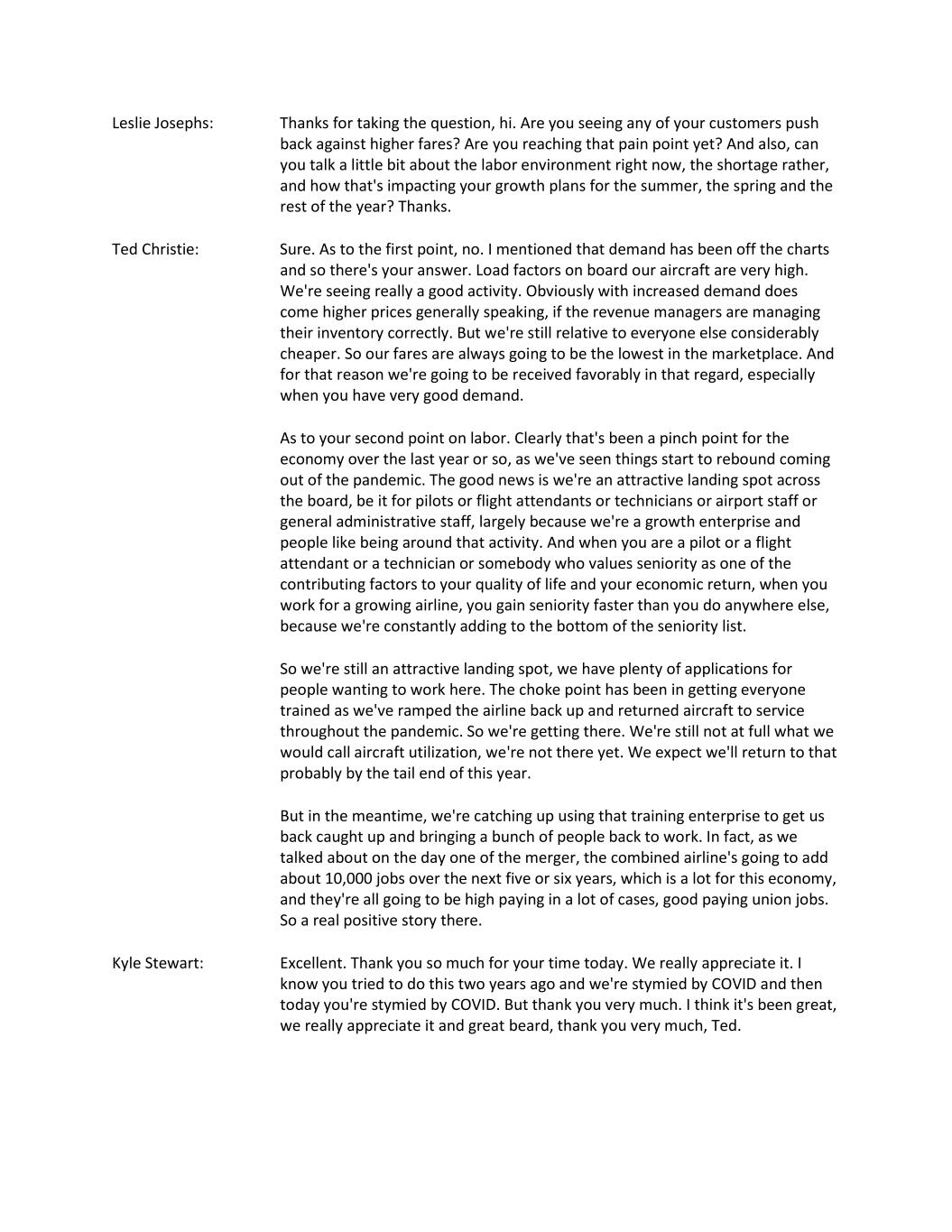
Leslie Josephs: Thanks for taking the question, hi. Are you seeing any of your customers push back against higher fares? Are you reaching that pain point yet? And also, can you talk a little bit about the labor environment right now, the shortage rather, and how that's impacting your growth plans for the summer, the spring and the rest of the year? Thanks. Ted Christie: Sure. As to the first point, no. I mentioned that demand has been off the charts and so there's your answer. Load factors on board our aircraft are very high. We're seeing really a good activity. Obviously with increased demand does come higher prices generally speaking, if the revenue managers are managing their inventory correctly. But we're still relative to everyone else considerably cheaper. So our fares are always going to be the lowest in the marketplace. And for that reason we're going to be received favorably in that regard, especially when you have very good demand. As to your second point on labor. Clearly that's been a pinch point for the economy over the last year or so, as we've seen things start to rebound coming out of the pandemic. The good news is we're an attractive landing spot across the board, be it for pilots or flight attendants or technicians or airport staff or general administrative staff, largely because we're a growth enterprise and people like being around that activity. And when you are a pilot or a flight attendant or a technician or somebody who values seniority as one of the contributing factors to your quality of life and your economic return, when you work for a growing airline, you gain seniority faster than you do anywhere else, because we're constantly adding to the bottom of the seniority list. So we're still an attractive landing spot, we have plenty of applications for people wanting to work here. The choke point has been in getting everyone trained as we've ramped the airline back up and returned aircraft to service throughout the pandemic. So we're getting there. We're still not at full what we would call aircraft utilization, we're not there yet. We expect we'll return to that probably by the tail end of this year. But in the meantime, we're catching up using that training enterprise to get us back caught up and bringing a bunch of people back to work. In fact, as we talked about on the day one of the merger, the combined airline's going to add about 10,000 jobs over the next five or six years, which is a lot for this economy, and they're all going to be high paying in a lot of cases, good paying union jobs. So a real positive story there. Kyle Stewart: Excellent. Thank you so much for your time today. We really appreciate it. I know you tried to do this two years ago and we're stymied by COVID and then today you're stymied by COVID. But thank you very much. I think it's been great, we really appreciate it and great beard, thank you very much, Ted.
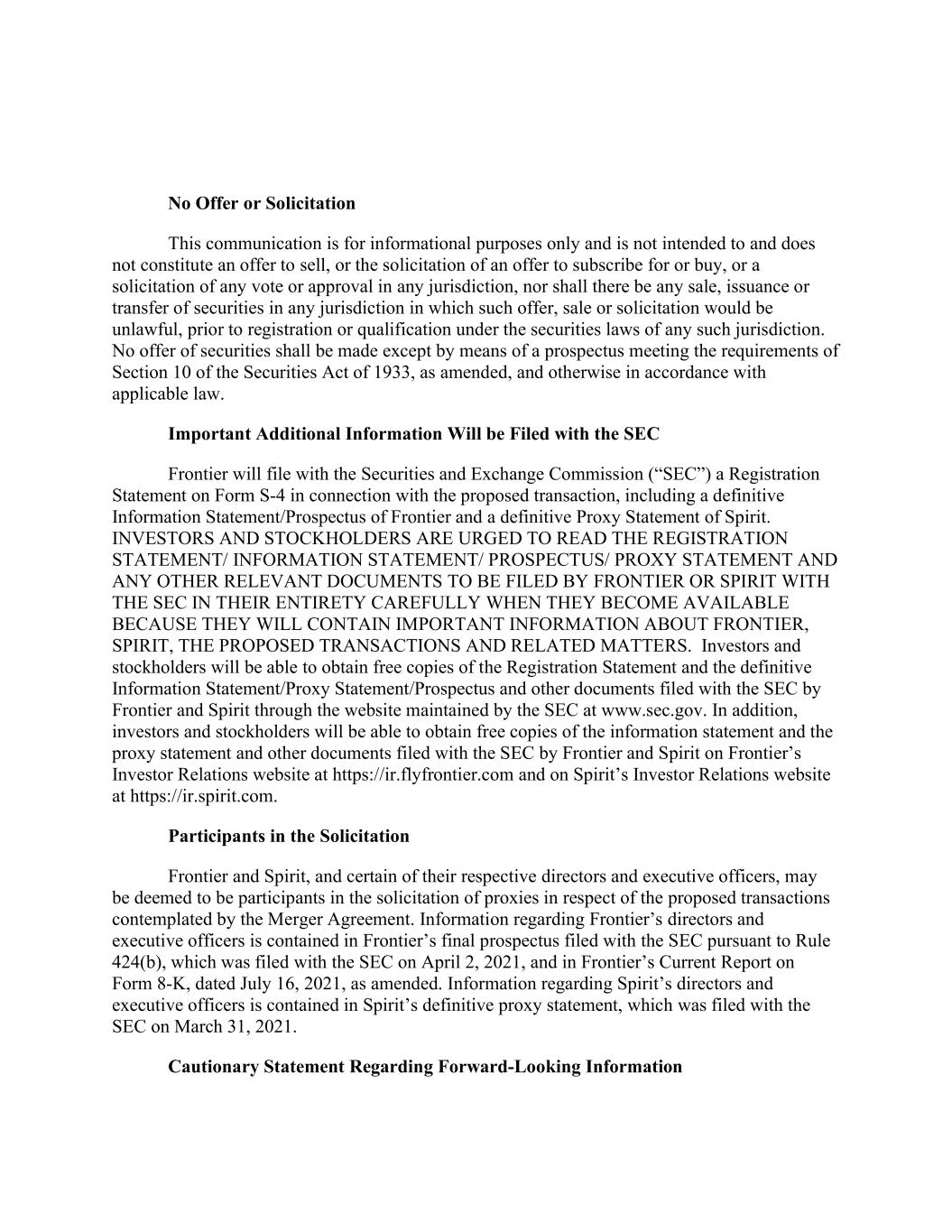
No Offer or Solicitation This communication is for informational purposes only and is not intended to and does not constitute an offer to sell, or the solicitation of an offer to subscribe for or buy, or a solicitation of any vote or approval in any jurisdiction, nor shall there be any sale, issuance or transfer of securities in any jurisdiction in which such offer, sale or solicitation would be unlawful, prior to registration or qualification under the securities laws of any such jurisdiction. No offer of securities shall be made except by means of a prospectus meeting the requirements of Section 10 of the Securities Act of 1933, as amended, and otherwise in accordance with applicable law. Important Additional Information Will be Filed with the SEC Frontier will file with the Securities and Exchange Commission (“SEC”) a Registration Statement on Form S-4 in connection with the proposed transaction, including a definitive Information Statement/Prospectus of Frontier and a definitive Proxy Statement of Spirit. INVESTORS AND STOCKHOLDERS ARE URGED TO READ THE REGISTRATION STATEMENT/ INFORMATION STATEMENT/ PROSPECTUS/ PROXY STATEMENT AND ANY OTHER RELEVANT DOCUMENTS TO BE FILED BY FRONTIER OR SPIRIT WITH THE SEC IN THEIR ENTIRETY CAREFULLY WHEN THEY BECOME AVAILABLE BECAUSE THEY WILL CONTAIN IMPORTANT INFORMATION ABOUT FRONTIER, SPIRIT, THE PROPOSED TRANSACTIONS AND RELATED MATTERS. Investors and stockholders will be able to obtain free copies of the Registration Statement and the definitive Information Statement/Proxy Statement/Prospectus and other documents filed with the SEC by Frontier and Spirit through the website maintained by the SEC at www.sec.gov. In addition, investors and stockholders will be able to obtain free copies of the information statement and the proxy statement and other documents filed with the SEC by Frontier and Spirit on Frontier’s Investor Relations website at https://ir.flyfrontier.com and on Spirit’s Investor Relations website at https://ir.spirit.com. Participants in the Solicitation Frontier and Spirit, and certain of their respective directors and executive officers, may be deemed to be participants in the solicitation of proxies in respect of the proposed transactions contemplated by the Merger Agreement. Information regarding Frontier’s directors and executive officers is contained in Frontier’s final prospectus filed with the SEC pursuant to Rule 424(b), which was filed with the SEC on April 2, 2021, and in Frontier’s Current Report on Form 8-K, dated July 16, 2021, as amended. Information regarding Spirit’s directors and executive officers is contained in Spirit’s definitive proxy statement, which was filed with the SEC on March 31, 2021. Cautionary Statement Regarding Forward-Looking Information
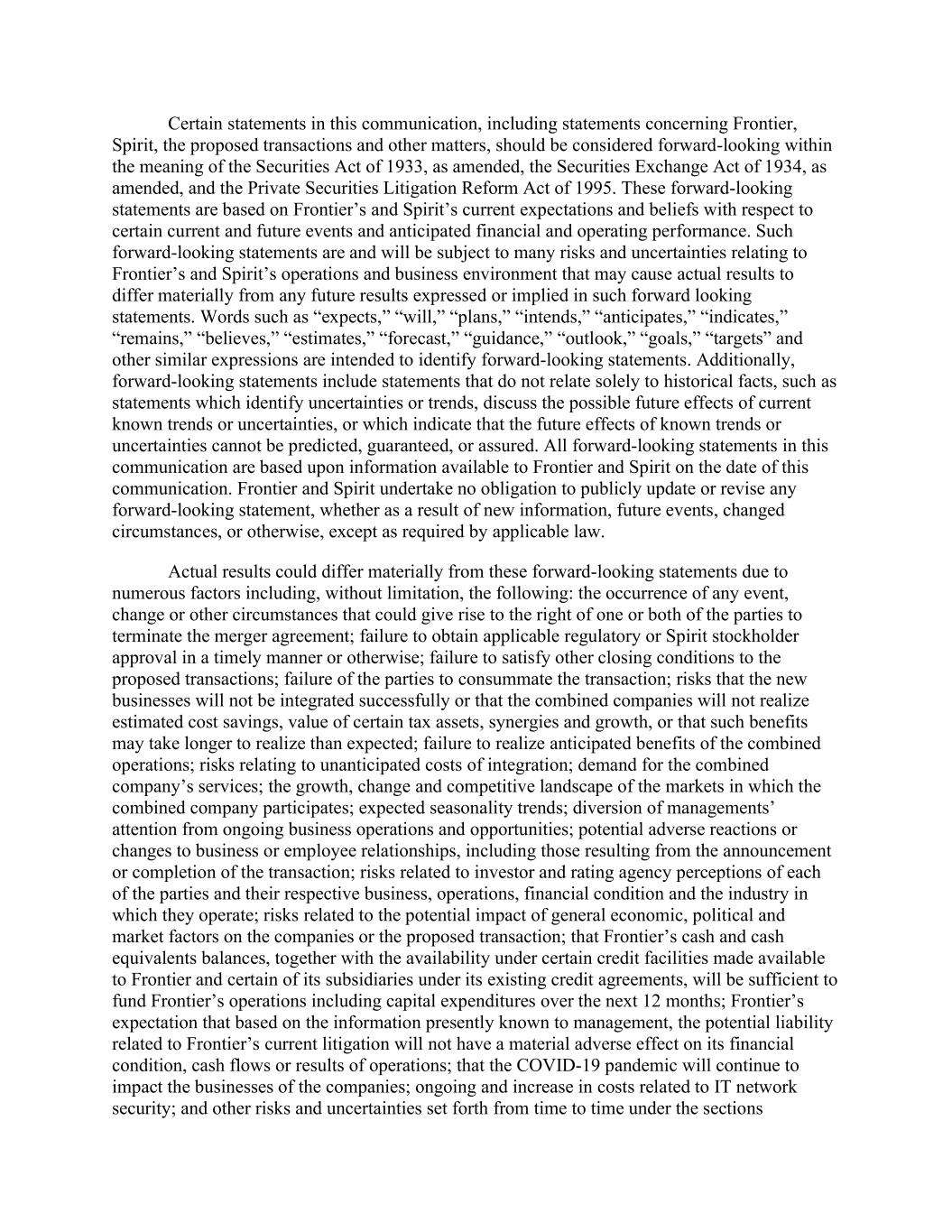
Certain statements in this communication, including statements concerning Frontier, Spirit, the proposed transactions and other matters, should be considered forward-looking within the meaning of the Securities Act of 1933, as amended, the Securities Exchange Act of 1934, as amended, and the Private Securities Litigation Reform Act of 1995. These forward-looking statements are based on Frontier’s and Spirit’s current expectations and beliefs with respect to certain current and future events and anticipated financial and operating performance. Such forward-looking statements are and will be subject to many risks and uncertainties relating to Frontier’s and Spirit’s operations and business environment that may cause actual results to differ materially from any future results expressed or implied in such forward looking statements. Words such as “expects,” “will,” “plans,” “intends,” “anticipates,” “indicates,” “remains,” “believes,” “estimates,” “forecast,” “guidance,” “outlook,” “goals,” “targets” and other similar expressions are intended to identify forward-looking statements. Additionally, forward-looking statements include statements that do not relate solely to historical facts, such as statements which identify uncertainties or trends, discuss the possible future effects of current known trends or uncertainties, or which indicate that the future effects of known trends or uncertainties cannot be predicted, guaranteed, or assured. All forward-looking statements in this communication are based upon information available to Frontier and Spirit on the date of this communication. Frontier and Spirit undertake no obligation to publicly update or revise any forward-looking statement, whether as a result of new information, future events, changed circumstances, or otherwise, except as required by applicable law. Actual results could differ materially from these forward-looking statements due to numerous factors including, without limitation, the following: the occurrence of any event, change or other circumstances that could give rise to the right of one or both of the parties to terminate the merger agreement; failure to obtain applicable regulatory or Spirit stockholder approval in a timely manner or otherwise; failure to satisfy other closing conditions to the proposed transactions; failure of the parties to consummate the transaction; risks that the new businesses will not be integrated successfully or that the combined companies will not realize estimated cost savings, value of certain tax assets, synergies and growth, or that such benefits may take longer to realize than expected; failure to realize anticipated benefits of the combined operations; risks relating to unanticipated costs of integration; demand for the combined company’s services; the growth, change and competitive landscape of the markets in which the combined company participates; expected seasonality trends; diversion of managements’ attention from ongoing business operations and opportunities; potential adverse reactions or changes to business or employee relationships, including those resulting from the announcement or completion of the transaction; risks related to investor and rating agency perceptions of each of the parties and their respective business, operations, financial condition and the industry in which they operate; risks related to the potential impact of general economic, political and market factors on the companies or the proposed transaction; that Frontier’s cash and cash equivalents balances, together with the availability under certain credit facilities made available to Frontier and certain of its subsidiaries under its existing credit agreements, will be sufficient to fund Frontier’s operations including capital expenditures over the next 12 months; Frontier’s expectation that based on the information presently known to management, the potential liability related to Frontier’s current litigation will not have a material adverse effect on its financial condition, cash flows or results of operations; that the COVID-19 pandemic will continue to impact the businesses of the companies; ongoing and increase in costs related to IT network security; and other risks and uncertainties set forth from time to time under the sections

captioned “Risk Factors” in Frontier’s and Spirit’s reports and other documents filed with the SEC from time to time, including their Annual Reports on Form 10-K and Quarterly Reports on Form 10-Q.












